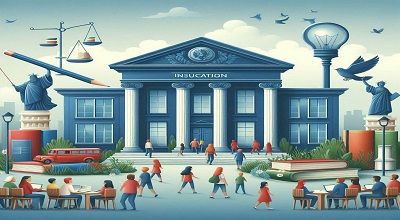Role of Institutions in Building Strong Education
The Role of Institutions in Building Strong Education. Institutions play a critical role in building a strong education system. The importance of education institutions, both at the K-12 and higher education levels, has been highlighted by various factors. Including advancements in technology, changing global dynamics, and the need for a highly skilled workforce. Here are some of the latest developments and roles of institutions in building a strong education system:
- Access to Quality Education: Educational institutions, especially at the K-12 level, are working to ensure equitable access to quality education. This includes addressing issues related to the digital divide, and ensuring that all students have access to technology and the internet. Providing support for underprivileged and marginalized students.
- Innovative Pedagogy: Institutions are increasingly adopting innovative teaching methods and technologies, such as online learning, blended learning, and flipped classrooms. These approaches help cater to diverse learning styles and offer more engaging and personalized educational experiences.
- STEM Education: Many institutions are emphasizing science, technology, engineering, and mathematics (STEM) education to prepare students for the jobs of the future. STEM education promotes critical thinking, problem-solving skills, and creativity.
- Skill Development: In response to the changing job market, educational institutions are placing a greater emphasis on developing skills that are in high demand. Such as digital literacy, data analysis, and communication skills. They are also partnering with businesses and industries to provide students with real-world experiences.
- Lifelong Learning: Institutions are recognizing that learning doesn’t stop after graduation. They are offering opportunities for lifelong learning. Including adult education, professional development, and upskilling programs, to help individuals adapt to evolving career demands.
More here…
- Inclusion and Diversity: There is a growing focus on creating inclusive and diverse educational environments that reflect the real world. Institutions are working to promote diversity among both students and faculty and are fostering an inclusive culture where all voices are valued.
- Research and Innovation: Higher education institutions play a crucial role in research and innovation. Contributing to technological advancements and breakthroughs in various fields. This research also informs and enhances teaching practices.
- Education Technology: The integration of education technology (EdTech) is becoming more prominent in institutions. This includes the use of learning management systems, virtual reality, and artificial intelligence. Other tools to enhance the educational experience and improve administrative processes.
- Accreditation and Quality Assurance: Institutions are subject to rigorous accreditation and quality assurance processes to ensure they meet established standards and deliver a high-quality education. This accountability helps maintain the integrity of education systems.
- Policy Advocacy: Educational institutions often engage in advocacy efforts to influence education policy at the local, state, and national levels. They work to shape policies that support their mission and the best interests of students.
- Global Collaboration: Institutions are increasingly collaborating on a global scale, fostering partnerships with other educational institutions. Governments and organizations to share best practices, research, and resources.
- Community Engagement: Many institutions are strengthening their ties to the local community. Offering resources and services that benefit both students and the broader population.
Conclusion
In conclusion, The Role of Institutions in Building Strong Education. Institutions play a critical role in building a strong education system. Educational institutions continue to evolve and adapt to meet the demands of a changing world. They play a central role in building a strong education system. That prepares students for the challenges and opportunities of the 21st century. This involves a multifaceted approach, including innovation, inclusion, research, and partnerships with various stakeholders.
